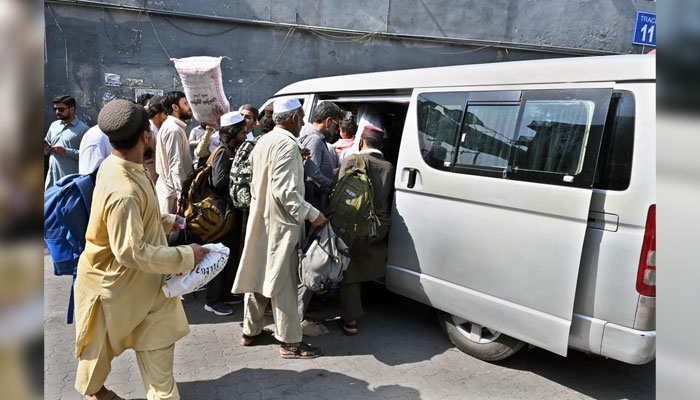Transporters fleece commuters as Eid approaches fast
Rawalpindi:The government has recently reduced fuel prices by over Rs25 per litre in a month. However, the benefits of this reduction have not been passed on to the public, as transporters continued to exploit passengers as usual.
At Rawalpindi Railway Station, there was a significant increase in the number of passengers on Thursday due to the reduced fares offered by Pakistan Railways. During the Eidul Azha celebrations, long-route transporters were seen overcharging passengers who were travelling to their hometowns. The transporters justified their actions by citing the high cost of fuel. They not only doubled the fares but also charged extra for luggage, taking advantage of the festive occasion.
The local administration in Rawalpindi seemed to have neglected the plight of passengers, leaving them at the mercy of the powerful transporters. Transport terminals including Soan Terminal, Hamrahi Terminal, Pirwadhai Terminal, Tehmasabad Terminal, Tarnol Terminal, and Faizabad Terminal were overcrowded with passengers heading home for Eidul Azha celebrations.
Rashid Ali, the Secretary of the District Regional Transport Authority (DRTA), highlighted the measures taken against overcharging and overloading by the transporters during Eid. He emphasized that the safety and security of commuters were their top priority, and strict monitoring of transporters was in place to prevent overcharging.
As Eidul Azha approaches, many residents of Islamabad-Rawalpindi are leaving for their hometowns. Passengers expressed their frustration with the significant overcharging by powerful transporters, especially in the case of inter-city travel. The scarcity of public transport vehicles has led to exploitative overcharging, causing conflicts between transporters and passengers.
-
 Camila Mendes Finally Reveals Wedding Plans With Fiancé Rudy Mancuso
Camila Mendes Finally Reveals Wedding Plans With Fiancé Rudy Mancuso -
 Beatrice, Eugenie Blindsided By Extent Of Sarah Ferguson’s Epstein Links
Beatrice, Eugenie Blindsided By Extent Of Sarah Ferguson’s Epstein Links -
 Girl And Grandfather Attacked In Knife Assault Outside Los Angeles Home
Girl And Grandfather Attacked In Knife Assault Outside Los Angeles Home -
 Super Bowl Halftime Show 2026: What Did Trump Say About Bad Bunny?
Super Bowl Halftime Show 2026: What Did Trump Say About Bad Bunny? -
 Piers Morgan Defends Bad Bunny's Super Bowl Performance, Disagrees With Trump Remarks
Piers Morgan Defends Bad Bunny's Super Bowl Performance, Disagrees With Trump Remarks -
 Andrew Lands In New Trouble Days After Royal Lodge Eviction
Andrew Lands In New Trouble Days After Royal Lodge Eviction -
 Instagram, YouTube Addiction Case Trial Kicks Off In California
Instagram, YouTube Addiction Case Trial Kicks Off In California -
 Agentic Engineering: Next Big AI Trend After Vibe Coding In 2026
Agentic Engineering: Next Big AI Trend After Vibe Coding In 2026 -
 Keke Palmer Makes Jaw-dropping Confession About 'The Burbs'
Keke Palmer Makes Jaw-dropping Confession About 'The Burbs' -
 Cher Sparks Major Health Concerns As She Pushes Herself To Limit At 79
Cher Sparks Major Health Concerns As She Pushes Herself To Limit At 79 -
 Former NYPD Detective Says Nancy Guthrie's Disappearance 'could Be Hoax'
Former NYPD Detective Says Nancy Guthrie's Disappearance 'could Be Hoax' -
 King Charles Publicly Asked If He Knew About Andrew's Connection To Epstein
King Charles Publicly Asked If He Knew About Andrew's Connection To Epstein -
 Jessie J Addresses Pregnancy Rumors After Sporting Belly Bump
Jessie J Addresses Pregnancy Rumors After Sporting Belly Bump -
 Channing Tatum Leaves Fans Scratching Their Heads With Message About South Korea
Channing Tatum Leaves Fans Scratching Their Heads With Message About South Korea -
 Emma Roberts Stars In 'A Body In The Woods'
Emma Roberts Stars In 'A Body In The Woods' -
 'Our Estrangements Can Kill Us': Meghan's Co-star Weighs In On Anthony Hopkins Interview
'Our Estrangements Can Kill Us': Meghan's Co-star Weighs In On Anthony Hopkins Interview




